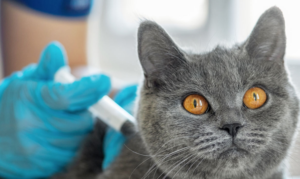
November is Pet Diabetes Month, and Mount Carmel Animal Hospital wants to let you know about it.
November is Pet Diabetes Month, and Mount Carmel Animal Hospital wants to let you know about it. Like people, diabetes in dogs and cats is caused by the body’s mismanagement of blood glucose. Uncontrolled diabetes can be disabling and eventually fatal even for pets.
Signs and Symptoms of Diabetes in Pets
The earlier your pet’s diabetes is caught, the better their outlook and the faster they can be managed. If you are familiar with diabetes in humans, you will notice a lot of similarities in symptoms. Even if you have serious doubts it could be diabetes; it is better to be safe than sorry. Here are signs of diabetes in pets:
- Excessive water drinking and urination
- Unexplained Weight Loss (especially if your dog has an increased appetite)
- Lack of appetite
- Hazy eyes
- Chronic infections (anything from the skin, eyes, urinary tract, etc.)
Diagnosing Your Pet’s Diabetes
To diagnose your pet with diabetes, the veterinarian will need to conduct a few tests. They must test for hyperglycemia (high blood sugar) and glucosuria (glucose in the urine). Although a diabetes diagnosis tends to be very clear, your veterinarian will likely do more tests to rule out other diseases.
Treating Your Pet’s Diabetes
Because diabetes is a chronic illness, your pet will have it for the rest of its life. Proper care of a diabetic pet can feel daunting, but once you and your pet build a safe routine around blood sugar checks and meal times, things will feel more normal. If your pet is diagnosed with diabetes, one of our veterinarians will prescribe insulin for your pet. For pets, all insulin must be administered under the skin through injection. Oral insulin is not an option. Before sending you home, we will ensure you know all you need to know to care for your diabetic pet. We will go over proper insulin storage and handling, obtaining blood sugar levels, and how to administer the insulin. We will also discuss with you any dietary changes that may be needed. Diet is a way to help control blood glucose, but it will not fix the disease. Managing your pet’s weight will benefit their joints as well as their diabetes. We will build your pet a regimen to best monitor their blood glucose levels. The regimen will include exercise, testing times, and adequate meals or snacks.
Here at Mount Carmel Animal Hospital, We’ll Treat Your Pets Like Family!
Mount Carmel Animal Hospital has been serving the Northern Baltimore/Southern York community for over 30 years and is proud to be an independently operated, small animal practice committed to excellence in veterinary medicine and client service. From grooming to wellness services, along with Canine Life Skills Training Courses, and surgical procedures, we have the expertise that will best serve the needs of you and your pet. Contact us at 410-343-0200 and follow us on Facebook!
